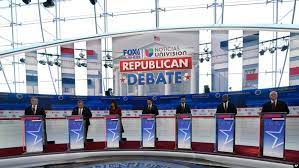Ken Bredemeier
Seven US Republican presidential candidates sparred sharply at a debate Wednesday night, each trying to break from the pack to become the main challenger to former President Donald Trump, who holds a commanding lead for the party’s 2024 presidential nomination, even as he faces four criminal indictments.
Trump, as he did last month, snubbed the party-sponsored debate, which immediately drew a rebuke from two of his opponents. “Donald Trump is missing in action,” said Florida Governor Ron DeSantis, Trump’s closest challenger, but still a distant second in national polling. “He should be on this stage to answer why he added $7.8 trillion” to the national debt.
Former New Jersey Governor Chris Christie jibed that if former president keeps avoiding the Republican presidential debates, “We’re not going to call you Donald Trump, we’re going to call you Donald Duck.” While his opponents appeared at the Ronald Reagan Presidential Library in California, Trump staged a political rally in Michigan, a Midwestern political battleground state where autoworkers are striking against the country’s three biggest auto manufacturers.
To cheers from supporters, the former president mostly attacked Democratic President Joe Biden and ignored the Republicans debating to overtake him in the chase for the party’s nomination. He accused “crooked Joe of shipping millions of jobs to China” and said Biden was pushing Americans to buy electric vehicles that are too expensive for most US households. Back on the debate stage, the other Republicans fired verbal lasers at each other, hoping to land a knockout punch that might give them an edge and leave them standing to fight another day against Trump. The result at times was a lot of cross-talk as Fox News moderators attempted, often in vain, to regain control of the debate.
Trump strategically figured he had nothing to gain by appearing on the same debate stage as his opponents when national polling compiled by RealClearPolitics shows him with 56% support among Republican voters for the nomination and a 42-point lead over DeSantis. The other Republicans are even further behind the former president. At one point, DeSantis addressed his poor showing against Trump, saying, “Polls don’t elect presidents. Voters elect presidents.”
After business entrepreneur Vivek Ramaswamy said he used the Chinese-owned TikTok social media site to reach a younger generation of Americans, Nikki Haley, Trump’s former US ambassador to the United Nations, rebuked Ramaswamy, saying, “Every time I hear you, I feel a little bit dumber for what you say.” Haley, a former South Carolina governor, also aggressively attacked her home-state senator, Tim Scott, assailing his performance in US Senate, while he defended his service.
Former Vice President Mike Pence, who was Trump’s second-in-command, asserted his conservative credentials and said he was most qualified through years in Congress and as a former governor in Indiana to become president. A long-shot candidate, North Dakota Governor Doug Burgum, cited his business acumen. After the first, indecisive debate among the Trump opponents, nationwide polling showed Trump actually widening his edge, even as he faces the prospect of spending weeks in courtrooms in the first half of 2024 on charges that he illegally tried to upend his 2020 reelection loss to President Joe Biden and illegally retained highly classified national security documents when he left office in early 2021.
With Trump’s majority support among the Republican base, his opponents have been hard-pressed to convince voters they are a better choice to run against Biden, a Democrat seeking reelection. Among the debaters, only Christie has pointedly assailed Trump for the criminal charges he is facing, as he did again Wednesday.
Former Arkansas Governor Asa Hutchinson, one other Republican contender who has attacked Trump and said he should drop out of the presidential nominating contest, failed to meet the criteria set by the Republican National Committee to be on the debate stage. The requirements included having at least 3% support in two national opinion polls, or 3% in one national and two polls from states holding their nomination contest early in the process – Iowa, New Hampshire, Nevada and South Carolina.
Candidates also needed at least 50,000 unique financial donors and to sign a pledge saying they will support the person who emerges as the Republican nominee. University of Michigan debate coach Aaron Kall told VOA that Wednesday’s seven candidates had to “directly take the fight to Trump … despite his absence, or else they risk simply rearranging the deck chairs on the Titanic, even if they continue to deliver solid performances. There is no hope for anyone to make up ground against Trump unless they engage him more directly.” Throughout the debate, though, the hopefuls aimed as much, or more, of their vitriol at Biden, as if they were in a general election campaign, including attacking him for showing up Tuesday on the picket line, supporting auto workers.
Scott said, “Joe Biden should not be on the picket line. He should be on the southern border” with Mexico to stop illegal migrants from entering the US Others attacked Biden’s handling of the US economy; high inflation during his White House tenure has left millions of US households feeling financially squeezed. Wednesday’s debate occurred 3½ months before the first Republican voting – party caucuses in the Midwestern state of Iowa to be followed quickly by contests in other states. One key political date is March 5, when party primary elections are scheduled in more than a dozen states, one day after Trump’s trial on election interference charges is set to start in Washington – a courtroom legal battle that could easily last for several weeks. A second trial, on the national security document allegations, is set to start May 20 in Florida. Republicans will formally choose their presidential candidate at a national convention in July.
VOA







